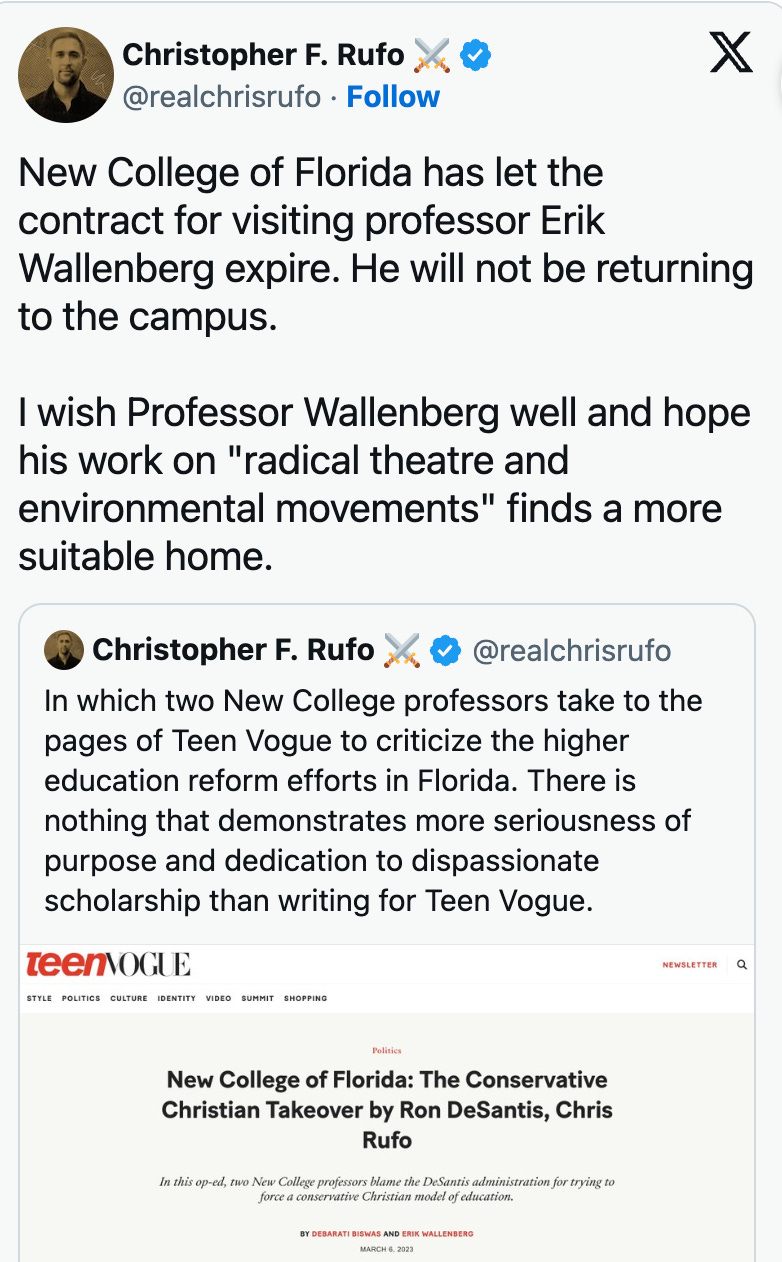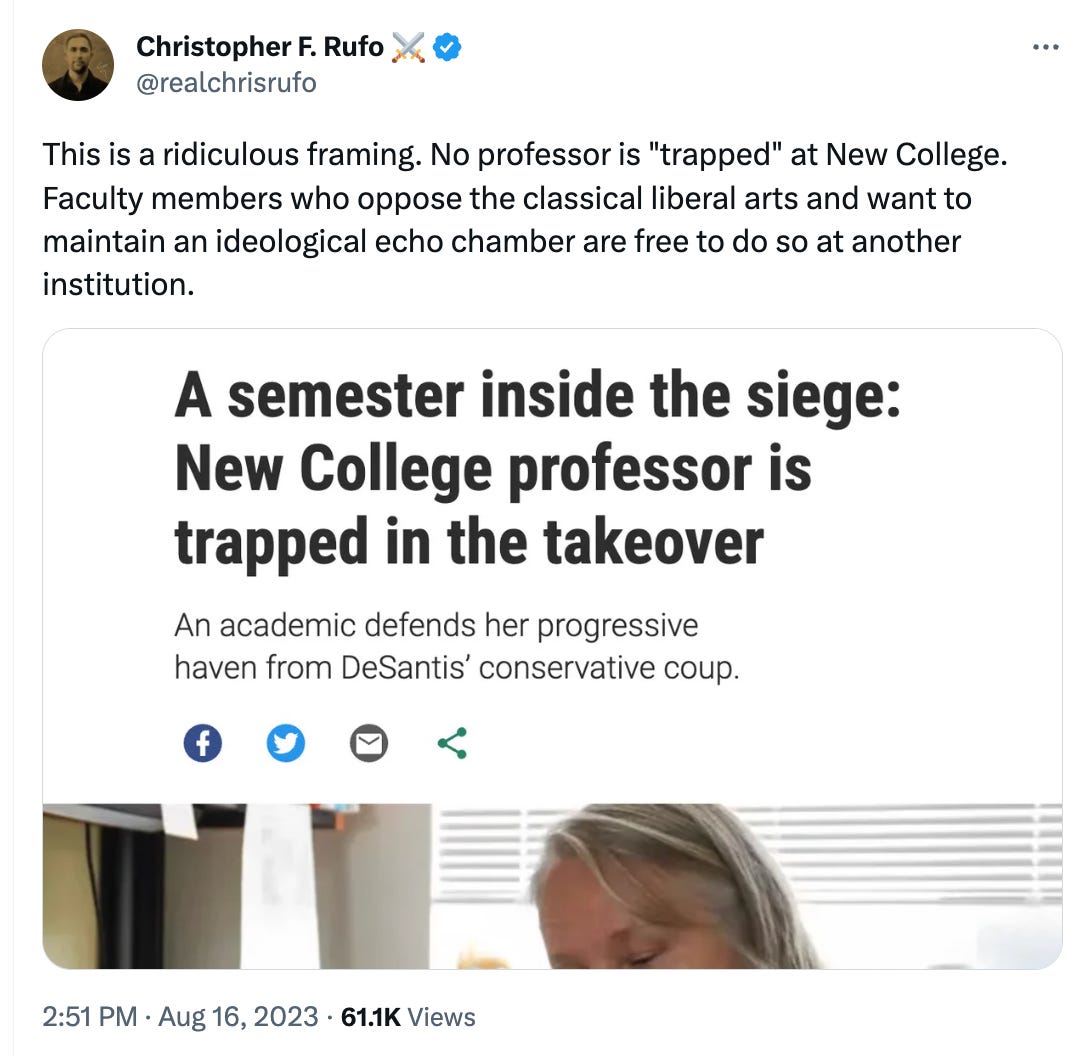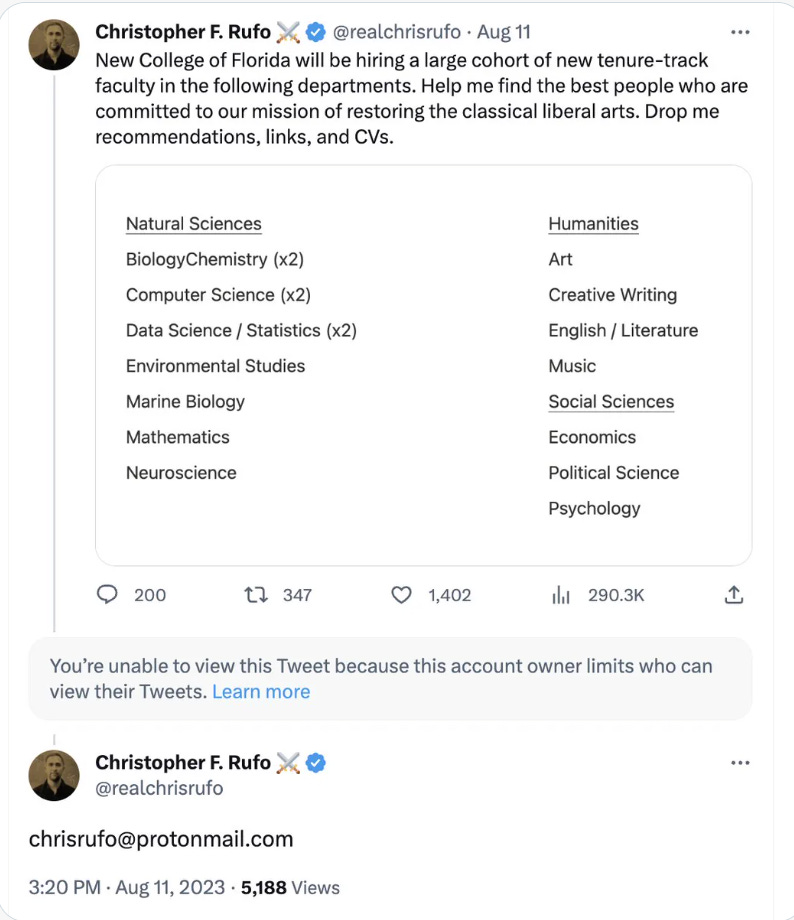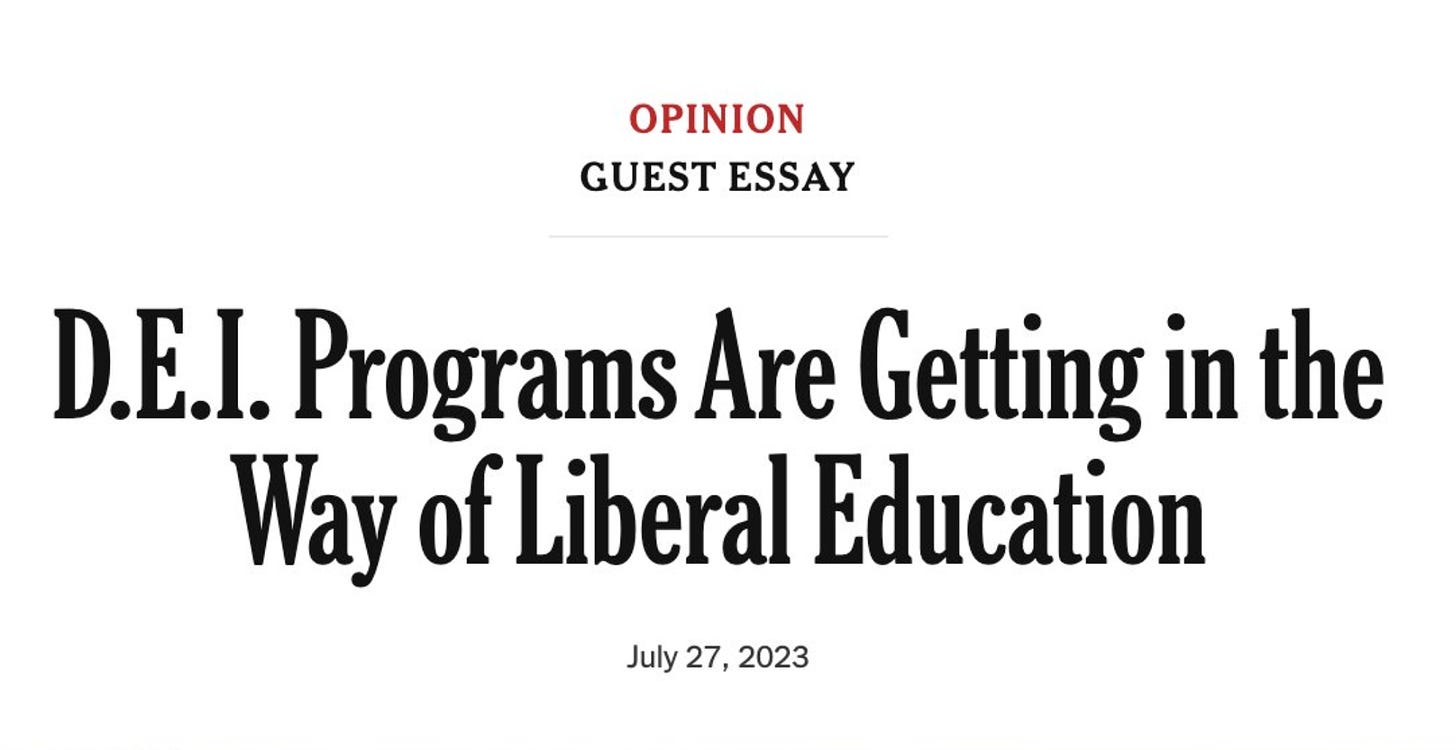Competence, the ability to perform organizational core tasks, is an underrated quality. In its presence, we take it for granted. We miss it only in its absence. It is an especially overlooked quality by people who value other things, like ideological goals, or people who believe that existing institutions are fundamentally corrupt, or people who have never actually run things.
And when you put those people in charge of our institutions, the price of incompetence suddenly looms large.
We are witnessing this right now with the gross mismanagement of New College in Florida, a public college that Ron DeSantis turned into a pet project. The idea was to turn this institution into a conservative bulwark, akin to Hillsdale College in Michigan. Instead, it has become a testament to populist incompetence, to the vast breadth between breezy platitudes about transforming higher education, and the reality of running a real institution, with real students.
As the new semester starts, New College is an administrative disaster. One third of faculty have gone. Students cannot find classes. Students with housing contracts are being relocated to an airport hotel.
The mismanagement of the New College is entirely predictable. It is a product of the DeSantis school of public management. Experienced administrators were pushed out. They were replaced by political cronies. The new President is a former GOP House speaker, who was handed a salary more than double than that of his predecessor. The new Dean of Students is a lobbyist. Trustees were selected for their ideological leanings rather than experience.
Faculty feel excluded given hostile messaging of the new trustees, cancelation of majors for ideological reasons, and the preemptory denial of tenure by the same trustees of five faculty without any actual review.
Existing students are voting with their feet: by August 1, more than 10% had already transferred to a Hampshire College, a small Massachusetts liberal arts program that offered New College the option to transfer.
Johanna Alonso, a reporter at Inside Higher Ed, has documented these failures. So much of this smacks as absolute indifference and even contempt for students, and an unwillingness to acknowledge that anything is wrong. For example, one departing faculty offered to continue to cover key classes over zoom. Administrators were initially responsive, but then declined her offer, which she suspects was due to her criticism of the new regime. And so students will have fewer options.
Her beliefs that trustees blocked her teaching is completely plausible. Chris Rufo, one of those trustees, boasted about the firing of an adjunct faculty member after they criticized the changes he and his fellow ideologues have made:

Very publicly firing faculty out of pique when you are creating massive teaching holes is incompetence. But Rufo is still encouraging faculty who disagree with him to leave.

Rufo is now soliciting new faculty on Twitter, asking for personal recommendations. Let me just note that involving political appointees with zero expertise in research areas you are hiring for is also incompetence.
Texas A&M learned this lesson the hard way, when they were forced to pay out $1 million when their regents employed an ideological litmus test to block the hire of a journalism professor they viewed as too liberal.

Rufo has considerable skill as a propagandist. But he has no experience in higher education, beyond advocacy against materials that relate to gender or race. He pushed the removal of gender studies from New College. His fellow trustees might have supported it. But abruptly removing majors in ways that are at odds with the demands and interests of students is, again, administrative incompetence. It creates a sense of instability, and indifference to student interests. It furthers the rush of faculty to the exit. It also makes it harder to hire qualified applicants. One professor at New College said:
The division chairs have made a heroic effort this summer to fill in the gaps in our academic programs. Sadly, their efforts are being hampered by an ideological litmus test imposed by the administration.
Beyond offering classes, another basic task of a university is to house students. This should not be so complicated. After all, it is not an ideological minefield. But again, rash choices lead to bad outcomes. The new trustees have convinced themselves that New College will become a liberal arts sports powerhouse. And so half of the entering freshman class are student athletes. New College now has 70 baseball players, about twice as many the University of Florida’s Division I baseball team.
Lets set aside the wisdom of throwing resources at the hopes of transforming a small liberal arts college with no sports facilities or membership of National Association of Intercollegiate Athletics into a mecca for sports. And lets ignore the fact that this decision appears to be motivated in no small part by a desire to give scholarships to bring more men to campus while lowering academic standards. About two-thirds of New College students are women. The trustees have decided to eliminate the concentration in gender studies, and instead start new programs in sports psychology, as well as finance and communications, to appeal to their athlete students. Hardly topics that are at the heart of a “classical liberal education.” In short, the trustees have decided to serve they students they believe should be at New College, while not supporting the students that are actually there.
The decision to prioritize athletics have had immediate effects on housing. The new athletes have been given housing traditionally reserved for juniors and seniors. These students, who had contracts for campus housing, are being moved. The campus has rented out an entire airport hotel to accommodate them. Students without vehicles can look forward to a walk on a busy highway to get to campus. One student said that he decided to leave New College in largely part because of the mismanagement of the housing situation:
I thought, ‘Oh my god, how many other people might have gotten that same email of, hey, basically, you’re on your own, kid. It just shows that they have not committed to what’s in the best interest of the student body. It’s so wrong, the way they’ve gone about it. The disorganization—I can’t wrap my brain around it. This is not how you run a college.
Quite.
Meanwhile, the New York Times recently featured Rufo on its opinion page, where he pinned an essay about the risks to liberal colleges. The chief risk: DEI programs.

Even if you think poorly of DEI programs, they aren’t actually destroying liberal education in the way that Rufo and fellow trustees are destroying New College.
There may be some version of a competent transformation of New College. But to be done well, it would have to be slower, doing limited harm to existing stakeholders, maintaining enough stability to manage the change without damaging the reputation of the institution.
This isn’t it.
Within a few years, it may be that New College will emerge as the Hillsdale of the south that DeSantis promised. After all, state taxpayers are now providing tens of millions to fund the experiment. The new President boasted earlier this year: “Over the last 90 days, New College has received almost $50 million in new funding from the state, which is more than the university has received in the past 20 years.”
Fifty million dollars is a lot of money for a college with 700 students. It is more than enough to serve current students well, while broadening the institution. But that is not what is happening. Instead, the ideologues leading New College are wreaking havoc, ignoring the rules of their institution, the norms of the profession, and the promises made to students. The sheer scale of the failures becomes all the more appalling given the scale of the resources on hand, resources previously denied to New College when it was judged not to align with the ideological preferences of the ruling party.
New College students and faculty have become collateral damage, unwilling subjects in an ideological lab experiment. Their greatest education may be to watch, firsthand, how ideological blinders destroy the competent management of American institutions.
People who lack experience, do not care about core organizational goals, will not listen to stakeholders, and are hell-bent on pursuing their narrow ideological agenda will ultimately destroy the organizations they are charged with leading.
This is a lesson that I expect more and more of us will be forced to learn in coming years. The New College students will just learn it first. They are learning that while populism promises to serve the people, it’s true purpose is to serve an ideological elite indifferent to the core clients of public services. If you read a glowing review of the “New” New College in the National Review or the Federalist or the Atlantic in a couple of years, spare a thought for the students whose college experience was destroyed to make this possible. Spare a thought for the resources wasted along the way.
In the meantime, people like Rufo and DeSantis are rewarded by a political economy that mistakes advocacy for achievement, and policy action for doing things well. The whole DeSantis boom was built on the mirage that he was Trump, but competent. But there is a vast difference between strong-arming policies through a friendly legislature, and managing the competing views and needs of lots of stakeholders. DeSantis has shown precious little capacity to engage with those who see the world differently. Rufo is the golden boy of the American far right for his ability to turn education into a culture war battlefield, but in the one case were he has actually been given responsibility for serving the students he claims to care about, he is failing them. When they lose interest and move onto another project, who will clean up the mess they have made?
